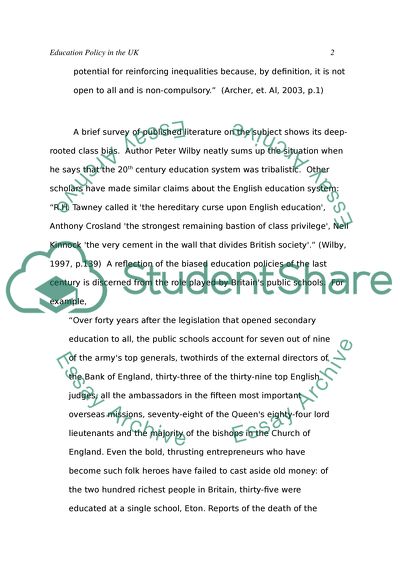Cite this document
(Education Policy in the UK Term Paper Example | Topics and Well Written Essays - 1750 words, n.d.)
Education Policy in the UK Term Paper Example | Topics and Well Written Essays - 1750 words. Retrieved from https://studentshare.org/education/1573924-discuss-the-proposition-that-english-education-policy-in-c-20th-has-been-shaped-on-the-one-hand-by-the-desire-to-uphold-class-privilege-and-on-the-other-by-the-necessity-to-broaden-access-so-as-to-stay-competitive-internationally
Education Policy in the UK Term Paper Example | Topics and Well Written Essays - 1750 words. Retrieved from https://studentshare.org/education/1573924-discuss-the-proposition-that-english-education-policy-in-c-20th-has-been-shaped-on-the-one-hand-by-the-desire-to-uphold-class-privilege-and-on-the-other-by-the-necessity-to-broaden-access-so-as-to-stay-competitive-internationally
(Education Policy in the UK Term Paper Example | Topics and Well Written Essays - 1750 Words)
Education Policy in the UK Term Paper Example | Topics and Well Written Essays - 1750 Words. https://studentshare.org/education/1573924-discuss-the-proposition-that-english-education-policy-in-c-20th-has-been-shaped-on-the-one-hand-by-the-desire-to-uphold-class-privilege-and-on-the-other-by-the-necessity-to-broaden-access-so-as-to-stay-competitive-internationally.
Education Policy in the UK Term Paper Example | Topics and Well Written Essays - 1750 Words. https://studentshare.org/education/1573924-discuss-the-proposition-that-english-education-policy-in-c-20th-has-been-shaped-on-the-one-hand-by-the-desire-to-uphold-class-privilege-and-on-the-other-by-the-necessity-to-broaden-access-so-as-to-stay-competitive-internationally.
“Education Policy in the UK Term Paper Example | Topics and Well Written Essays - 1750 Words”. https://studentshare.org/education/1573924-discuss-the-proposition-that-english-education-policy-in-c-20th-has-been-shaped-on-the-one-hand-by-the-desire-to-uphold-class-privilege-and-on-the-other-by-the-necessity-to-broaden-access-so-as-to-stay-competitive-internationally.


